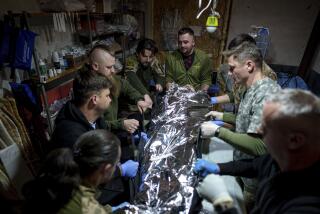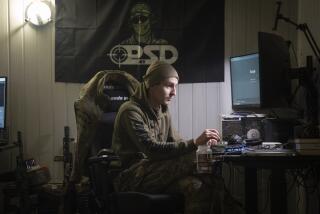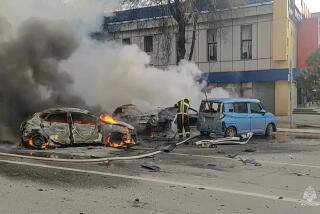Chechen Spring Ushers In Season of Russian Air Raids
- Share via
VEDENO, Russia — April is good bombing weather in Chechnya.
Here in the Chechen rebels’ alpine stronghold, farmers wake up, gaze at the glorious sunlight that bathes the snow-tipped Caucasus Mountains and shudder.
Because whenever the weather is clear, Russian jets come streaking up from the flatlands toward these craggy peaks. On the pure blue palette of sky, their rockets paint wispy white arrows that show villagers where to look for the dead.
A Russian rocket sailed through the roof of Markha Mutalipova’s farmhouse not long ago. It killed her mother, who was holding 21-month-old Markha in her arms, and tore off both the child’s feet. Sturdy, round-faced Markha survived, but her 8-year-old sister and five neighbors died with her mother.
“Before, she used to cry ‘Mama, Mama’ all the time,” said Markha’s aunt, Heidi Mutalipova. Now the wounded toddler just cries for hours, and nobody in Vedeno Hospital seems able to console her. Her aunt wants to evacuate Markha as soon as possible, because Vedeno is bracing for a bombing any day now.
In recent weeks, Russia’s 4-month-old war on this secessionist republic has entered a new but still lethal phase.
After two months of fierce fighting, Moscow’s troops have finally driven the Chechen rebels from the flatlands that lie south and east of the captured capital, Grozny, and into the Caucasus Mountains.
On paper, Russia can now claim to control three-fifths of Chechnya. Rebels hold only the mountainous southeast, and they are slowly being strangled by a blockade that has all but closed Chechnya’s borders with Dagestan and Georgia.
Russian officials appear desperate to crush the Chechen resistance quickly before President Clinton arrives in Moscow on May 9 to commemorate the 50th anniversary of the Allied victory over Nazi Germany. Yet the reality in the war zone is far nastier and more complex than the Kremlin’s pronouncements make it seem.
Russian attacks and atrocities against civilians are apparently on the increase. Chechen villagers who had been neutral until their homes were leveled and their relatives killed now say they are ready to take up arms against the hated Russian invaders. And top Chechen commanders interviewed last week in their mountain stronghold in Vedeno, 38 miles southeast of Grozny, said they have the means, the men and the will to fight a guerrilla war indefinitely.
Grozny is far from pacified. Over the weekend, rebels staged at least two overnight attacks on the capital, and Russians say snipers kill three or four soldiers every day.
By day, Russians control the key outlying towns of Argun, Shali, Atagi and Gudermes. But at night, Chechen guerrillas creep down from the mountains to punish their old enemy, Ivan.
In turn, the Russians are continuing the scorched-earth policy that turned Grozny into a blasted-out hulk.
Russian authorities say they attack only villages that resist their advance. But in the mountains, bombers have pummeled farmhouses and shepherds’ huts, and low-flying planes have strafed cars, cattle and people with machine guns, witnesses said.
On the flatlands, Russian forces bombed, shelled or burned at least three southeastern Chechen villages last week. Refugees and residents insisted that they had never harbored militants or that they had forced the fighters to leave town in exchange for promises from the Russians that there would be no reprisals.
“There was not one person in our village with a rifle,” said Vakha Rukmanov, an elder from Niki-Khita, about 25 miles southeast of Grozny. The elders thought they had a pledge from Russian troops to leave them alone as long as they kept fighters out.
Nevertheless, Rukmanov said, 13 adults and 17 children were killed and 80 others wounded by a Russian missile attack Thursday.
“Today my heart has become cruel,” the 42-year-old forestry manager said. “I have never held a gun in my hands, as Allah is my witness, but today I want to go buy a gun and fight them.”
The bombardment of the lowlands was so intense last week that it rattled windows in Vedeno, which sits 8,200 feet above sea level.
To Chechens, Vedeno is the symbol of the centuries-long struggle against foreign domination. The rebels have pitched their headquarters inside a 19th-Century fortress built by Shamil, the Chechen national hero who held off Russian armies for more than 30 years until he was forced to surrender in 1859.
Chechen President Dzhokar M. Dudayev was not in Vedeno last week. Aides said the most wanted man in Russia had gone hunting with friends for a bear that had been preying on cattle in the mountains.
Several Chechen fighters said they had no interest in Dudayev’s whereabouts and insisted that the war will go on with or without him.
“We are not fighting for Dudayev--we’re fighting for our freedom,” said Aslan Askhabov, 31, a veteran of Grozny and Shali who sported the green Islamic headband that signified his readiness to die for Chechnya’s independence.
Dudayev’s commanders were kept busy last week directing the hundreds of volunteers like Askhabov who streamed into Vedeno toward positions in the mountains.
The bearded rebels, weighed down with automatic rifles, grenades and even machine guns, had made it through a menacing cordon of Russian tanks, artillery and helicopter patrols.
Some fighters came by jeep on back roads, some by armored car. Some hitched rides on cattle trucks, and not a few hiked in on dirt tracks jammed with refugees.
Shamil Besayev, a 30-year-old Vedeno native who is one of Dudayev’s top lieutenants--and perhaps the fighters’ most popular commander--said he had ordered all fighters out of Vedeno by Sunday so as not to give the Russians a pretext to bomb the town.
“The Russians will bomb the villages and the countryside, but at least they will not be able to justify themselves to the world by claiming they’re only bombing military bases,” Besayev said.
In the urban battlefield of Grozny, Besayev said, the Chechen defenders had a tactical advantage, but on open ground their weaponry and manpower were no match for the mighty Russian army. In the mountains where the Chechens have fought every invader since Genghis Khan, Besayev said, the Chechens are once again in their element.
Russian tanks can drive to Vedeno only along one narrow road leading through a steep valley, making them easy marks for sharpshooters. The mountains offer caves, canyons and thick forests in which to hide from Russian planes.
Besayev and his men spend their spare time taking aim at low-flying Russian aircraft with machine guns. He claims to have shot down three helicopters and six planes.
Ammunition is no longer a problem. Just last week, Besayev said, he bought an entire carload of bullets, grenade launchers, grenades, rifles and a silencer from a Russian officer.
Sometimes Russian units that are preparing to return home will give their remaining weapons and ammunition to the Chechens in exchange for a promise not to attack them, he said.
“If I had enough money, I could buy a whole division,” Besayev said. “A Russian soldier sees a dollar and forgets his own mother.”
More to Read
Sign up for Essential California
The most important California stories and recommendations in your inbox every morning.
You may occasionally receive promotional content from the Los Angeles Times.










